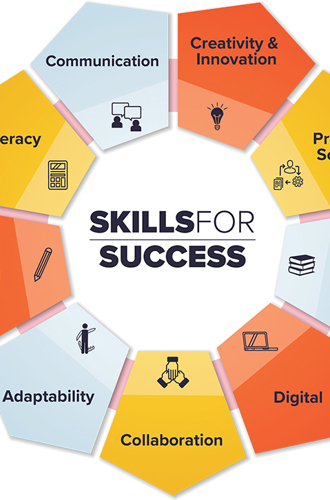Launching your own business is a big undertaking. It’s challenging and exciting—often at the same time. Before you open for business, take some time to learn about the skills you’ll need.
Being self-employed requires 2 specific skill sets:
The 9 Skills for Success
Employers are always looking for 9 particular skills for success:
- Adaptability—being able to learn new skills, deal with change, and not give up.
- Collaboration—working with people from diverse backgrounds and cultures, and dealing with co-workers and others in difficult situations.
- Communication—understanding, listening to, and sharing information with others.
- Creativity and innovation—coming up with new and different ways to do things.
- Digital—using digital technologies to solve problems and to find and share information.
- Numeracy—using math information in different formats (numbers, words, symbols).
- Problem solving—knowing how to find the right information, find new solutions, and make decisions.
- Reading—finding and using information written in words, symbols, or images.
- Writing—sharing ideas and information by using words, symbols, or images.
As your own boss, you’ll want them too. They’ll help in all aspects of your new business, no matter what products or services you offer.
Consider how your skills can help your business
You may already excel at some of these skills and you can improve on the ones you’ll need. Imagine how you could transform your business by being an expert communicator or a wizard at all things digital. Take a moment to think about what each of these skills could add to your business.
Specific business skills and experiences
In addition to the 9 core skills for success, consider the other strengths and assets you may have to help you run your business:
- Business experience. You have an advantage if you’ve worked in a small business. If you haven’t, ask for advice from a mentor, friend, or family member who has. Learn the common terms used in your line of work and some of specifics you’ll need to think about. For example, will you need to put in a few months of long hours around the holiday season?
- Education. Whether you went through college or university, took a short-term course or certification, or pursued self-directed learning, education can give you the right skills to start a business.
- Decision-making. Quick decisions made without much thought aren’t always the right ones, but fretting about decisions isn’t beneficial either. Being able to make sound, informed decisions quickly is a key skill.
- Money management. First-time business owners may spend too much money on the wrong things. Knowing how much to spend, and on what, is crucial. Learn how to find funding to launch and build your business.
- Marketing. Understanding how to promote your product or service is key to your success.
- Networking. Knowing the right people can make a difference. Build up a network of people who understand the type of work you want to do and stay connected with them.
Because of your experiences, you may have learned many of these skills without knowing it. For example, did you learn about:
- Customer service at a retail job?
- Accounting at a business?
- Marketing while studying or working in communications?
- Organization while doing… almost anything?
- A combination of skills while volunteering?
You may also have natural skills such as artistic talent or the ability to talk to anybody. Or you may have picked up practical skills along the way like making videos or building a website.
“Individuals can learn and grow from every experience, from what they learn inside the classroom and outside of the classroom, volunteer experience and part time jobs. Take time to reflect on the skills you are building and what you have learned from those experiences. Students working in a team on a case study or business problem are building communication skills, collaboration skills, problem solving, creativity and adaptability.”
A checklist of self-employment skills
Go over the checklist below to see what skills you’ve learned in your everyday life. Have your experiences taught you to:
- Take measured risks when necessary?
- Understand how starting a business might affect your lifestyle and income?
- Make sound decisions quickly and without too much worry?
- Tackle new situations with confidence and optimism?
- Follow your own path no matter what others think?
- Be confident about your ideas and plans?
- Let go of failures easily, but also learn from them?
- Ask questions when you don’t know something?
- Communicate effectively with all kinds of people?
If you checked off most of these, you’re well on your way.
“These skills are like muscles. You can learn how to strengthen each one with a bit of work. And you don’t have to be an expert in all of them before starting your business. Figure out which are most important for you and get really good at those. You can always hire people to help with things you’re not as good at.”</em></br></br> <strong>—Drew Wolsey, Chair, Entrepreneurship & Innovation Program, JR Shaw School of Business, NAIT</strong>
Becoming self-employed won’t always be easy. Take time up front to understand the skills that entrepreneurs need and improve in areas where you’re weak. This way, you’ll be ready to deal with challenges, adapt to change, keep learning, and become a successful business owner.
Thank you for visiting alis.




